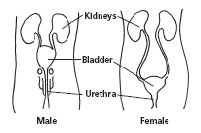Rigid Cystoscopy

What is a rigid cystoscopy?
This is an examination of the inside of your bladder using a rigid telescopic tube (cystoscope).
Why should you have this examination?
Some urinary problems can be sorted out following tests on the urine, blood, or with x-rays. Often, the only way that the doctor can be sure of what is happening is to look inside the bladder using a cystoscope, and take samples of the bladder lining for laboratory examination.
What preparation do you need?
Important:
- If you are taking aspirin, you should stop taking it 10 days before your cystoscopy.
- If you are taking warfarin, please phone the Day Surgery Unit on 020 7288 5098/5097, as soon as possible.
- You can take your other medications as usual, but with just a sip of water.
- You should have a light breakfast on the day of your procedure, but nothing to eat or drink after 10am.
- Please read your ‘Coming in to the Day Surgery’ leaflet carefully
When you arrive
- When you arrive in the Day Surgery Unit a nurse will take your details. You will need to get changed into a patient gown.
- A doctor will explain the examination to you and ask you to sign a consent form to confirm that you understand the procedure and agree to go ahead with it.
- You will be given an injection of antibiotics to prevent infection and a sedative to make you sleepy. You will also be given a suppository for pain relief.
- A needle will be put in your hand so extra sedation can be given to you if necessary. Local anaesthetic is introduced into the urethra. This is in the form of a spray for women and a gel for men.
What happens during the examination?
- The sedative will make you feel sleepy throughout the procedure and for many patients it induces sleep afterwards, making the examination a hazy memory. A cystoscopy takes only a couple of minutes.
- The cystoscope is passed through the urethra into the bladder so that the doctor can see what the problem may be.
- The doctor may also decide to take biopsies (small samples of tissue) of the lining of your bladder, to send to the laboratory; this is not painful.
- After your procedure you will go to Recovery then back to the Day Surgery Unit where you can have something to eat and drink once you have woken up fully.
After the examination
- The doctor will discuss the results of the examination with you before you go home. A biopsy result may take up to two to three weeks. You will be given an outpatient’s appointment for this.
- A letter will be sent to your GP. You will also be given a copy.
- You can go home once you have recovered from your sedation and have passed a satisfactory amount of relatively clear urine.
- Please arrange for someone to pick you up and if possible be with you overnight.
- You should not drive or use machinery (this includes cookers) for 24 hours after having sedation. You should also avoid alcohol for 24 hours.
- You may feel a burning pain when you pass urine, this is quite normal. Drinking up to six pints of fluid a day will help to reduce it. The burning sensation usually improves over a day or so.
- Bleeding is common, especially if you have had biopsies taken. This usually settles after a few days, but remember to keep drinking plenty of fluids.
- You can recommence your Aspirin and warfarin the next day.
Are there any risks?
Everything possible will be done to ensure your safety and comfort. However there is risk associated with any procedure.
- There is a small risk of a urinary tract infection. The best way to avoid an infection is to drink plenty of fluids. If you get a temperature, smelly urine, or pain or bleeding lasting more than two days you should contact your GP or visit the Emergency Department.
- Very occasionally people find it difficult to pass urine following this type of procedure. If this occurs at home and your abdomen is swollen and painful go to your local Accident and Emergency Department.
Any further questions?
If you have more questions please phone:
The Day Surgery Unit on 020 7288 5098/5097 (Monday – Friday, 8.30am – 5pm).
Last updated22 Apr 2008

